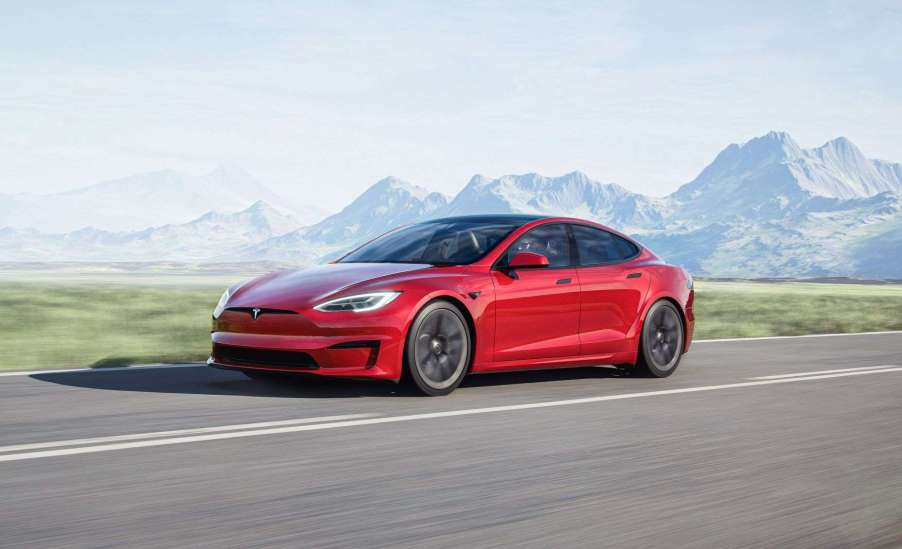
EV Car Batteries Destroy the Environment and Violate Human Rights
Automotive companies and environmentalists herald electric vehicles as one of the solutions to addressing environmental problems such as the climate change crisis and air pollution. With their electric powertrains, EVs produce zero carbon emissions. However, electric vehicles have a dirty secret: the lithium and cobalt that are in EV car batteries destroy the environment and violate human rights.
What is the environmental impact of lithium-ion batteries in electric vehicles?

Electric vehicles hold much promise for addressing environmental problems. However, as currently built, EVs contribute to environmental problems in ways that many people might not even realize. As detailed by the Institute for Energy Research, lithium-ion batteries in electric vehicles have a considerable negative impact on the environment.
Lithium mining requires a massive amount of water, which is increasingly in short supply in many regions of the world. Approximately 500,000 gallons of water get used for every ton of lithium mined. To extract lithium, “miners drill a hole in salt flats and pump salty, mineral-rich brine to the surface.” The water then evaporates after several months, which leaves lithium and other minerals.

The Lithium Triangle in South America, which includes portions of Bolivia, Chile, and Argentina, contains more than half of the world’s supply of lithium. The region is also very dry. In Chile’s Salar de Atacama, lithium mining consumes 65% of the region’s water. The problem is so bad that farmers and other people in the local communities have to get water elsewhere.
Lithium-ion EV car batteries cause water, soil, and air pollution

In addition to using a great deal of water, lithium mining causes water, soil, and air pollution. Toxic chemicals like hydrochloric acid used in the mining process can leak from evaporation pools and contaminate the surrounding area.
Another problem regarding lithium-ion EV car batteries is the high amount of lithium-ion waste. For example, in Australia, “only two percent of the country’s 3,300 metric tons” of lithium-ion batteries get recycled. The lithium-ion waste typically ends up in landfills, where it can potentially leak into the environment.
In addition to lithium, another mineral used in EV car batteries is cobalt. Unfortunately, cobalt mining has many of the same negative environmental impacts as lithium. This includes water, soil, and air pollution.
How do lithium-ion EV car batteries violate human rights?
One of the human rights, as defined by the United Nations, is “access to safe, sufficient and affordable water, sanitation, and hygiene facilities.” With this in mind, lithium mining for EV car batteries violates human rights. This is because it wastes a considerable amount of water in dry areas — and causes water contamination.
The United Nations also declared that “having a clean, healthy, and sustainable environment is a human right.” Lithium and cobalt mining violate this human right by causing water, air, and soil contamination.
Furthermore, much of the lithium and cobalt mining is in impoverished areas. Miners often work in deplorable and unsafe conditions. Most of them have a low pay level that places them well below the poverty line.
Much of the lithium is mined from Bolivia, one of the poorest countries in South America. To further exacerbate the problem, Elon Musk and Tesla faced accusations that they tried to destabilize the Bolivian government to gain greater access to its large supply of lithium. In an infamous tweet, Musk wrote that they are going to “coup whoever they want.”

The Democratic Republic of the Congo (DRC) holds more than half of the world’s reserves of cobalt. In the DRC, cobalt mining heavily uses child labor, which is another violation of human rights. Also, many of the cobalt miners in the DRC lack the necessary protective equipment. Furthermore, as detailed by the Washington Post, the contamination from cobalt mining resulted in health ailments for people in the surrounding communities, such as birth defects and breathing problems.
Are there any alternatives to lithium and cobalt for EV car batteries?
With the negative effects of lithium and cobalt on the environment and human rights, it begs the question, “Are there any alternatives for EV car batteries?” As detailed by NewScientist, there are some alternatives. However, most of them are still in the early stages of development. This includes:
- Liquid batteries
- Fuel cell batteries
- Glass batteries
- Salt
- Seawater
- Magnesium
Out of this list, one of the most practical alternatives for car batteries for electric vehicles is salt. It has a similar chemical composition as lithium. Also, there is a large supply of salt around the world, and salt mining has a lower environmental impact.
An intriguing alternative on the list is liquid batteries. Also known as flow batteries, liquid batteries work in a similar fashion as traditional batteries. However, they differ in that the components get dissolved in liquids.
One of the advantages of liquid batteries is that they can be pumped into an electric vehicle very rapidly — similar to the rate of pumping gas into a car. Because of this, liquid EV car batteries could address another problem facing electric vehicles: the long time it takes to charge a vehicle. However, the technology for liquid EV car batteries still has a ways to go before it can be proven to be safe and effective.
This article was updated on 7/19/2022.


